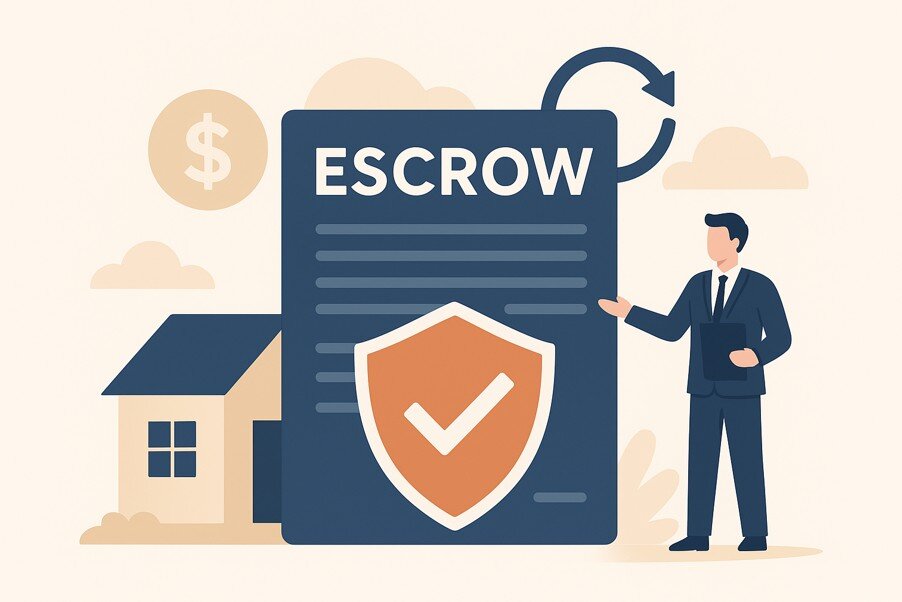
What Is Escrow and Why Does It Matter?
Escrow is a neutral third-party process that ensures both buyers and sellers meet all contractual obligations in a real estate transaction before funds and property change hands. It acts as a safeguard for both parties, holding earnest money, documents, and other assets until all conditions are fulfilled. Escrow protects your investment, mitigates fraud, and ensures a smooth transfer of ownership.
The Typical Escrow Timeline
Average Escrow Duration in Texas
In Texas, the typical escrow process takes 30 to 45 days, depending on the complexity of the transaction and the responsiveness of all involved parties. Factors like mortgage approval, title clearance, and inspections can impact this timeline.
Step-by-Step: What Happens During Escrow
Opening Escrow
Once the purchase agreement is signed, an escrow account is opened with an escrow agent or company. The buyer deposits earnest money, and the process officially begins. This typically happens within the first 1–3 days.
Home Inspection and Appraisal
The buyer schedules a home inspection to assess the property’s condition. If issues arise, repairs or price adjustments may be negotiated. Simultaneously, the lender orders a home appraisal to confirm the property’s value. This can take up to 10 days.
Title Search and Insurance
A title company reviews the property’s ownership history to ensure it’s free of liens or legal claims. Title insurance is also arranged to protect against future disputes.
Final Loan Approval
After the appraisal and underwriting process, the lender issues a final mortgage approval. This includes verifying employment, credit, income, and property documentation. Any delays here can stall closing.
Closing and Disbursement
Once all contingencies are met, documents are signed, and funds are transferred, the sale is recorded with the county. The escrow officer disburses payments to all parties, and the buyer receives the keys.
Common Escrow Delays (and How to Avoid Them)
Top Reasons Escrow Takes Longer Than Expected
Financing Issues
Lenders may require additional documentation or face underwriting delays. If a buyer’s financial situation changes mid-process (like a job loss or new debt), loan approval may be postponed or denied.
Appraisal Problems
If the home appraises for less than the agreed sale price, it may lead to renegotiations, second appraisals, or deal cancellations.
Title or Legal Complications
Unexpected liens, ownership disputes, or missing documentation can delay title clearance and stall closing.
Incomplete Documents or Missing Signatures
Simple errors like unsigned documents, missing disclosures, or delays in notarization can cause unnecessary hold-ups.
Tips to Prevent Escrow Delays
- Choose experienced lenders, real estate agents, and escrow officers.
- Submit all required documents promptly.
- Avoid making large purchases or changing jobs during escrow.
- Schedule inspections and appraisals early.
- Review all documents carefully and sign promptly.
Expert Tips to Navigate Escrow Smoothly
How to Speed Up the Escrow Process
- Get pre-approved for a mortgage before making an offer.
- Work with responsive professionals.
- Keep communication open between all parties.
- Use electronic document signing tools when possible.
What Buyers and Sellers Can Do to Stay on Track
Buyers should keep their finances stable and be proactive with paperwork.
Sellers should ensure the home is accessible for inspections and appraisals and be flexible with scheduling.
When to Involve a Real Estate Attorney or Escrow Officer
Consider hiring a real estate attorney if:
- The transaction is complex.
- There are title issues or inherited properties involved.
- You’re unfamiliar with legal terms in the contract.
An escrow officer should always be involved, as they manage the timeline, hold funds, and ensure compliance with state laws and contract terms.
FAQs About Escrow Timelines
Can Escrow Close Early?
Yes, escrow can close early if all contingencies are met ahead of schedule and both parties are ready. This requires proactive coordination and quick responses.
What Happens If Escrow Falls Through?
If escrow falls through, the transaction is canceled. Depending on the reason, the buyer may lose their earnest money deposit. Common causes include financing failure, appraisal issues, or unresolved repair negotiations.
Is Escrow Time the Same for Cash Buyers?
No. Cash buyers can often close in as little as 7 to 14 days, since they skip the mortgage approval process. However, inspections, title work, and legal formalities still need to be completed.